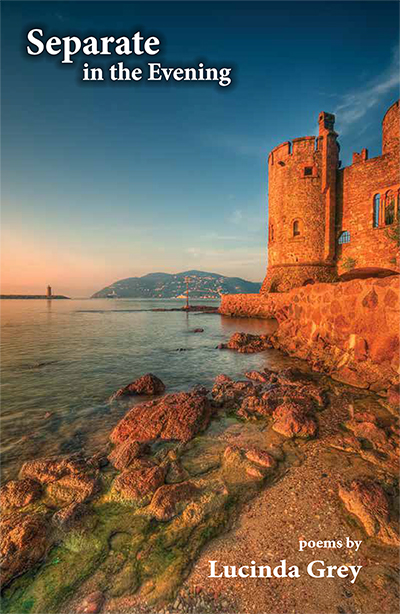Separate in the Evening
$11.00
In stock
Lucinda Grey is recently retired from UNC Charlotte, where she taught writing since 1985, and co-edited Southern Poetry Review for several years. Separate in the Evening, a finalist in the 2016 Cathy Smith Bowers Chapbook Contest, is based on a love relationship that developed when Lucinda was a resident at Le Château de La Napoule (pictured on the cover). Non-English speaking places have fed her creativity in most of her five former books: The Blue Hills: after the life of Maud Gonne, (Comstock Review), The Woman Who Has Eaten the Moon (Wind Press), Ribbon Around a Bomb (Wind Press), Martin Flores and the House of Dreams (Main Street Rag), and Letter to No Address (Andrew Mountain Press).
Anyone who’s known ecstasy in a romantic relationship that couldn’t last will identify and quite possibly weep reading these heart-rending and beautiful poems. Lucinda Grey’s Separate in the Evening is a poignant, moving sequence centered on passion and heartbreak. There is no solace but memory; only, in the end, “the blanket fragrant with oranges”—except, of course, the solace of art, which reconciles and redeems. ~Susan Ludvigson
Long a master of the persona poem, Lucinda Grey has turned her attention to personal loss, that of a love affair that could never work out. If you think there is nothing new to say about this subject, she will prove you wrong. Most of the poems are set in the south of France, and they reflect both an outer and inner landscape. She asks, “How would it be if only / we lived in the subjunctive / where is not if / were contrary to fact?” There is no blame here, no accusation in these heartfelt observations: “You never could have left this place. / I never could have stayed.” What is lasting is the desire for what could have been. Yet, each person must come to terms with loss, and this speaker does, stating at the end what will remain: “. . . there will be this shore, / this blanket fragrant with oranges.” ~Gail Peck, author of The Braided Light
Reclaiming a Language
In six short weeks
your French devoured my Spanish.
Your chien mechant eating my perro,
my pajaro swallowed by your oiseau
until el amor languished to l’amour.
I miss the punctuated flamenco,
the matador, the bull.
I’m drinking vinegar
to purge the nasal from my blood
until my tongue can trill arriba,
fingers drumming on my thigh in time,
and girl and ghost are gypsy lovers
meeting in the plaza at midnight,
love urgent again as death.
Separate in the Evening
…perhaps the same
bird echoed through both of us
yesterday, separate in the evening…
Rilke
Sometimes I’m ashamed of my loneliness,
thinking what a strange solitary person
I am. Then I almost blame myself
for your waiting so long for me,
whoever you are. Perhaps
you’re caught at a light,
startled by your own lack of purpose
as all the drivers with direction
in their lives cut a swath around you.
Or in a restaurant
after both the host and waitress have inquired,
separately, if you’re dining alone.
You do not hide yourself in a book
but watch the party of eight
as their pizzas are lowered
with a flourish to the waiting racks.
Sitting back, you let the wave of voices
break over you.
And this weekend you’re in a bookstore
watching women browse the magazines
as if you could will them into your life.
You’ve picked Metropolitan Home,
propping it up so they can see.
None seem to notice. You shrug, pulling
Sports Illustrated from the bottom
of your stack, knocking your coffee over.
What it comes down to is this:
you and I on our separate porches at dusk,
the rhythm of my swing echoing your rocker,
my cardinal calling from the willow,
the same song that settles in your chest.
When You Come to the Other Side of Love
you’ll find the children gone into their lives,
the house for the first time straight,
the car belonging only to you.
Then you can rest
your life on the bed, look at the ceiling,
plan what you’ve always wanted to do,
though you can’t remember what.
You could sit on the porch with the cat
on your lap, you could watch a movie.
When you come to the other side of memory
you can let yourself forget
the times you moved, learning
the numbers, the languages, the names,
no matter if your French still sounds
like Spanish, no matter the hesitancy.
When you come to the other side
of need, you’ll leave your lips unrouged,
your nails unpolished, you’ll
remove the purple shawl and
for the first time lie down with yourself.

